Mysteries of the last hours of the Reich Chancellery
How we tried to steal the victory
At dawn 1 May 1945 of the year, the head of the General Staff of the Land Forces of Germany General of Infantry General Hans Krebs arrived at the command post of the commander of the 8 th Guards Army of Colonel-General V.I. Chuikov. The German general gave Chuikov a document on his authority, signed by Borman, and Hitler’s “Political Testament”. At the same time, Krebs handed Chuikov a letter to Stalin from the new German Reich Chancellor Goebbels. It read: "We inform the leader of the Soviet people that today, in 15 hours, 50 minutes the Führer voluntarily passed away. On the basis of his legitimate right, the Führer handed over all power in Borod's testament to him, I and Borman. I authorized Bormann to establish contact with the leader of the Soviet people. This communication is necessary for peace negotiations between the powers with the greatest losses. Goebbels. "
The most significant details of the talks that followed and the events that followed on that day were repeatedly described in memoirs and books on stories. They were depicted in at least a dozen domestic and foreign films. It seems that the story of these last hours of the battle for Berlin is exhaustive. However, their careful study raises doubts about whether we all know how the agony of the Third Reich actually happened.
Why these negotiations did not lead to the surrender of Germany 1 May? For some reason, a few hours after Krebs arrived with a letter from Goebbels, the author of the letter, his wife, their children, and also his envoy to Chuikov lost their lives? Where did Borman disappear without a trace, commissioning Goebbels to "establish contact with the leader of the Soviet people"? To try to find answers to these questions, you should point out a number of events that occurred before 1 May 1945.
In search of a separate peace
Directing Krebs to Chuikov, Goebbels could recall his previous attempts to begin negotiations with the USSR for peace. Already the defeat of the German troops at the Kursk Bulge and the surrender of Italy forced him to think about the inevitability of the defeat of Germany. Being at Hitler’s headquarters in Rastenberg, Goebbels wrote 10 September 1943 in his diary the essence of his discourse on a separate world: “We have a problem, which side should we turn first to the Russians, or to the Anglo-Americans. recognize that it will be difficult to wage war against those and others at the same time. " In a conversation with Hitler, Goebbels asked the Führer, "Isn’t it worth to do anything in relation to Stalin." According to Goebbels, Hitler "replied that so far nothing needs to be done. The Fuhrer said that it would be easier to negotiate with the British than with the Soviets. At present, the Fuhrer believes that the British can come to their senses more easily.
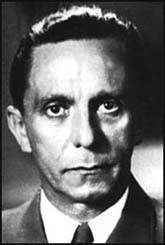 22 March 1945 Mr. Goebbels again suggested Hitler "to talk with the representative of the Soviet Union" and was again refused.
22 March 1945 Mr. Goebbels again suggested Hitler "to talk with the representative of the Soviet Union" and was again refused.By this time, the Reich Foreign Ministry headed by I. von Ribbentrop had repeatedly tried to start separate negotiations with the Western powers. To this end, the State Secretary of the Reich Minister Weizsäcker was sent to the Vatican, the adviser of the Reich Minister von Schmieden was sent to Switzerland, and in March 1945 was sent to Stockholm by an employee of Hesse Ribbentrop in Stockholm. All of these missions ended in failure, which caused Goebbels to gloat, Ribbentrop and his ministry didn’t care.
At the same time Goebbels ridiculed appearing in the Western press reports that the initiative of peace negotiations comes from Heinrich Himmler. 17 March Goebbels wrote: “It’s ridiculous that in such messages the Germans’s guarantor called Himmler instead of the Führer. It is stated that the powerful German clique offered the head of the Führer as a pledge. Of course, there is not a word of truth.”
Only a month and a half later, Goebbels realized his mistake. Then it turned out that Himmler had long conducted such negotiations through the chief of foreign intelligence services of the SS, Schellenburg, who established contact with the representative of the International Red Cross, Count Bernadotte in Sweden. At the same time, through General Wolf, Himmler conducted talks in Switzerland with the head of the United States Bureau of Strategic Services (later the CIA) Allen Dulles and representatives of British intelligence. In the Hitler leadership, supporters of a separate peace with the Western powers were also Hermann Goring and Albert Speer.
Whose flag will be hoisted over the Reichstag?
However, Goebbels admitted in his diary: the moment for a separate peace was missed. At this time, the question arose: who would take Berlin? The arrangement of forces in Europe and the world depended on this in many respects. Western allies, especially Great Britain, made persistent attempts to prevent the strengthening of the positions of the USSR.
On April 1, British Prime Minister Winston Churchill wrote to US President F. D. Roosevelt: "The Russian armies will undoubtedly seize the whole of Austria, and will enter Vienna. If they also capture Berlin, would they not have an exaggerated idea that they had made an overwhelming contribution to our common victory, and could this not lead them to such a mood that would cause serious and very significant difficulties in the future? Therefore, I believe that from a political point of view, we should move as far as possible eastward in Germany, and if Berlin is within reach, we should certainly take it. "
The English prime minister was not only thinking about prestige. On the same days, the commander of the British armed forces in Europe, Field Marshal Montgomery, received a secret directive from Churchill: “Carefully assemble the German weapon and fold it so that it could easily be handed out to German soldiers, with whom we would have to cooperate if the Soviet offensive continued. "Churchill was apparently ready to send the Allied armies together with the German fascist troops to strike at his Red Army and knock out her from central europe.
Another 29 March Goebbels wrote in his diary: "Montgomery, in his statement, stressed the intention to reach the capital of the Reich whenever possible". At the same time, Goebbels recognized: "It is probably true that, as stated by the US press agencies, the enemy seized bridges over the Main because of the betrayal. There are indeed elements among our leaders on the Western Front who would like to end the war in the West as soon as possible and therefore play on the hand of Eisenhower ".
The implementation of the Allied plans was also facilitated by their secret negotiations with leaders from the German leadership, including Himmler. These negotiations became the subject of correspondence between Stalin and Roosevelt, to which the Soviet leader, not without reason, accused the allies of treachery.
These accusations of Stalin were sent to Roosevelt, although in a message from 3 on April, the Soviet leader wrote: “I don’t understand ... the silence of the British, who provided you with correspondence on this unpleasant question, while they themselves remain silent, although it is known that the initiative in this whole story with the talks in Bern belongs to the British”. It was obvious that Stalin himself considered it useless to read the moral of Churchill, who was particularly active in order to weaken the positions of the USSR. At the same time, harsh words addressed to the US president had a definite goal: Stalin made it clear that violating allied obligations in Europe, the United States threatened the fulfillment of allied obligations undertaken by the USSR in Yalta to participate in hostilities against Japan. After all, this Roosevelt sought from the Soviet Union from the end of the year 1941.
Stalin achieved his goal. The United States broke off negotiations with representatives of the German military command. In his message received in the Kremlin on April 13, Roosevelt thanked Stalin for "a sincere explanation of the Soviet point of view regarding the Berne incident, which, as it now seems, has faded and gone into the past, without bringing any benefit". Roosevelt expressed the hope that in the future “there should be no mutual distrust, and minor misunderstandings of this nature should not arise”. He expressed confidence that “when our armies make contact in Germany and unite in a fully coordinated offensive, the Nazi armies will disintegrate”.
However, on the same day, news of the death of Roosevelt came to Moscow and Stalin sent "deep condolence" to the new US President Truman, assessing the deceased as "the greatest global policy."
In addition to diplomatic measures, the Soviet leadership took military efforts to thwart attempts to steal the Victory from our people. On the day when Winston Churchill sent a message to F. Roosevelt, the commanders of the fronts G. K, Zhukov and I. S. Konev were summoned to JV Stalin on April 1. According to the memoirs of I. S. Konev, General Shtemenko "read aloud a telegram, the essence of which briefly boiled down to the following: the Anglo-American command is preparing an operation to capture Berlin, setting the task to capture it before the Soviet Army ... The telegram ended with According to all the data, the plan of taking Berlin before the Soviet Army is viewed by the Allied headquarters as quite realistic and preparation for its implementation is in full swing. After Shtemenko read the telegram to the end, Stalin turned to Zhukov and me: "So who will take Berlin, we or allies?" Konev wrote: "So it happened: I had to answer this question first, and I answered:" We will take Berlin and take it before the Allies ".
In the meantime, German resistance on the Western Front has practically ceased. 16 on April, the day the Berlin operation began, Zhukov told Stalin that, judging by the testimony of a prisoner of war, the German troops were given the task of resolutely not giving in to the Russians and fighting to the last man, even if the Anglo-American troops would go to their rear. Learning about this message, Stalin, turning to Antonov and Shtemenko, said: "It is necessary to reply to Comrade Zhukov that he may not know everything about Hitler’s negotiations with the allies." The telegram said: "Do not pay attention to the testimony of a German prisoner. Hitler weaves a web in the Berlin area to cause disagreement between the Russians and the allies. This web must be cut by Berlin taking by Soviet troops. We can do it, and we will do it.".
Cutting the cobweb that Hitler's spiders wove
The attack on Berlin by the forces of the 1 of the Byelorussian and 1 of the Ukrainian Fronts, launched on April 16, led to the fact that the Soviet troops of April 21 were in the suburbs of the German capital.
At this time, the Nazi leaders made efforts to direct all forces to fight the Red Army. 22 On April, Hitler accepted General Jodl’s proposal to transfer General Wousse’s newly formed 12 Army and General Busse’s 9 Army from the Western Front to the Eastern Front. These armies were to move into the southern suburbs of Berlin and, having joined there, strike at the troops of the 1 of the Ukrainian Front.
Konev recalled: "Hitler’s orders during this period, all his efforts to unlock Berlin, all orders given to this subject — Wenka, Busse, and the commander of the 3 army, Heinrici, and Schörner with his group of troops, and Grand Admiral Doenitz, who The idea was to break through to Berlin with the sailors, - all this, given the current balance of forces, did not have a real base. But at the same time, it would be wrong to regard such attempts as a deliberately absurd. who deployed during the battle for Burley m) made them unrealistic. Hitler’s ideas would not have collapsed by themselves. They could collapse only as a result of our armed influence. It was the successes of the Soviet troops gained in the difficult battles for Berlin, every day, with each passing hour more and more exposed the illusoryness of their last hopes , plans and orders of Hitler ".
Aware of the inevitability of collapse, Hitler's comrades hurried to agree with the allies about the surrender. 23 April in a bunker Hitler received a telegram from Goering, who was in Obersalzberg. Goering wrote to his Führer that, since he had decided to stay in Berlin, he, Goering, was ready to accept "the general leadership of the Reich." By this time, Goering decided to fly to Eisenhower to capitulate to the Anglo-American forces. Having received the message of Goering, Hitler flew into a rage and immediately ordered to remove Goering from all the posts he held. Soon Goering was taken into custody, and Borman prepared a report on the resignation of Goering from his post as head of the Luftwaffe due to worsening heart disease.
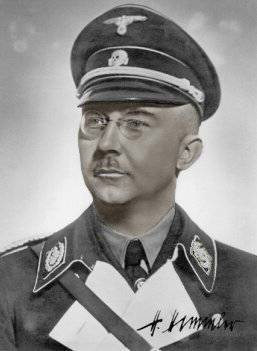 In his memoirs, the Minister of Arms of Germany Albert Speer told about the conversation with Himmler, which took place near Hamburg after the arrest of Göring. According to Speer, Himmler did not attach importance to what had happened. He said: "Now Goering will be the successor. We have long agreed with him that I will be his prime minister. Even without Hitler, I will make him (Goering) the head of state ... Naturally, I will make decisions. I have already contacted a number of individuals who will enter my office. "
In his memoirs, the Minister of Arms of Germany Albert Speer told about the conversation with Himmler, which took place near Hamburg after the arrest of Göring. According to Speer, Himmler did not attach importance to what had happened. He said: "Now Goering will be the successor. We have long agreed with him that I will be his prime minister. Even without Hitler, I will make him (Goering) the head of state ... Naturally, I will make decisions. I have already contacted a number of individuals who will enter my office. "Himmler was confident in the strength of his position and his indispensability. He spoke: "Europe will not be able to cope without me in the future. I will need you as a police minister. It’s enough for me to spend an hour with Eisenhower and he will understand it. They soon realize that they depend on me. Otherwise they will face hopeless chaos."
April 21 Himmler secretly from Hitler led negotiations with Norbert Mazur, the director of the Swedish section of the World Jewish Congress, trying to establish contact with Eisenhower through him to capitulate on the Western front. In exchange, Himmler agreed to release Jewish prisoners from a number of concentration camps. Thus, an agreement was reached on the release of thousands of Jews from Ravensbrück under the pretext of their Polish origin.
April 23 Himmler met with Count Bernadotte at the Consulate of Sweden in Lübeck. According to the memoirs of Schellenberg, Himmler said to the count: "We, the Germans, have only to declare themselves defeated, and I ask you to convey my words through the Swedish government to General Eisenhower, so that we all can avoid further unnecessary bloodshed. For us, the Germans, and especially for me, it is impossible to capitulate to the Russians. We will continue to fight against them until the front of the Western powers takes the place of the German front. "
Schellenberg recalled: "Himmler indicated that he had the right to decide on this issue, since the death of Hitler was a matter of two or three days. At least Hitler would die in the struggle to which he devoted his life to the struggle against Bolshevism". At the same time, Himmler wrote a letter to Swedish Foreign Minister Christian Gunther with a request to pass Himmler's declaration on ending the war to the leadership of the Anglo-American forces and the governments of the United States and Great Britain.
In his memoirs, B. L. Montgomery wrote that on April 27 he had learned from the British War Department about this proposal of Himmler. Field Marshal wrote: "Himmler argued that Hitler was hopelessly ill, and he (Himmler) was in a position that allowed him to take full authority in his hands. ". Although Montgomery claimed that he "did not pay much attention to this message," he noted further: "The continued Russian offensive was more dangerous than the defeated Germans. I knew that the Germans were almost over. The most important and immediate task was to move westward with all speed and break through to the Baltic Sea, and then create a flank turned to east. That was the only way to keep the Russians out of Schleswig-Holstein, and thus into Denmark. ". Thus, Himmler’s willingness to capitulate in the west fully met the plans of Montgomery.
However, the defeat of the main forces of the German forces by the Red Army in the Berlin battle, the encirclement of Berlin, the Soviet troops ’coming to the Elbe testified to the failure of several leaders of the Western powers, and, above all, to Churchill to weaken the significance of the Soviet successes. On April 25, Soviet soldiers met with American soldiers in the Strela area on the Elbe River and in the Torgau area on the Elbe River. These meetings turned into a vivid demonstration of the solidarity of the peoples of the anti-Hitler coalition. This event was marked by an order of the Supreme Commander and a salute in Moscow. Stalin, Churchill, and the new President of the United States, Truman, had timed their radio appearances on this expected event. These speeches, broadcast on 27 on April 1945, demonstrated to the world the unity of the allies in the anti-Hitler coalition. Under these conditions, leading figures of Western countries, above all, the United States decided not to aggravate relations with the Soviet Union, seeking to ensure the participation of the Red Army in the war against Japan.
In his book of military memoirs, “The Crusade to Europe,” General Dwight Eisenhower wrote that as the fighting ended in Europe, “it was time to take on the second task. All over the world, Allied forces were involved in an operation against the eastern ally of the Axis powers. Russia officially everything was still in a state of peace with the Japanese. " Eisenhower emphasized that the United States hoped to perceive "information", according to which "Generalissimo Stalin told Roosevelt in Yalta that within three months from the date of the surrender the Red Army would enter the war with Japan." Therefore, the Americans not only sought not to aggravate relations with the USSR, but also tried to speed up Germany’s surrender so that the three-month period before the Soviet Union entered the war with Japan began to expire. This position of the American government ultimately influenced Britain’s policies, although Churchill’s secret directive for Montgomery regarding German soldiers and their weapons was not repealed.
On April 9, 25, on the day of the meeting of Soviet and American troops on the Elbe, British Foreign Secretary A. Eden and US Secretary of State E. Stettinius informed W. Churchill and G. Truman about Himmler's proposals. The British Prime Minister and the President of the United States regarded them as an attempt to sow discord between the allies. They said that surrender is possible only to all three allies at the same time.
Two days later, on April 27 at an informal meeting of the British delegation, which arrived in San Francisco to attend the founding conference of the United Nations, Anthony Eden casually remarked: "By the way ... from Stockholm sources we learned that Himmler, through Bernadotte, made a proposal for Germany’s unconditional surrender to the Americans and us. Of course, we informed the Russians about this".
Cleverly organized "information leakage" was immediately picked up by the media. Present at this meeting, the director of the British Information Service in Washington, Jack Winokavr, conveyed this news Paul Rankine from Reuters, but asked not to indicate her source. Early in the morning of April 28, this news appeared in London newspapers.
In the 9 hours of the evening of April 28 from the BBC broadcast, Hitler learned about Himmler’s talks with Count Bernadotte. According to the famous third Reich pilot, Hannah Reich, who had just flown to Berlin, Hitler "turned purple, and his face was distorted beyond recognition". Reich, who had a tendency to utter long and emotional monologues, subsequently colorfully described this attack of the Fuhrer's rage. In frenzy, Hitler shouted about the low betrayal of a man whom he trusted the most. He announced that Himmler would be stripped of all his titles. Reich then repeated the orders of Hitler, given to them by her and Ritter von Graeme, who had just been appointed by the commander-in-chief of the German air force instead of Goering: to immediately fly out of Berlin, in order to "arrest Himmler as a traitor".
This was not easy to do: von Grame was wounded in the leg and moved on crutches. Therefore, although he was put aboard a light aircraft, he was led by Hannah Reich. Taking off in the street at the Brandenburg Gate under the fire of the Soviet anti-aircraft artillery, Reich managed to escape from besieged Berlin and sent the plane to Ploen, where Dönitz headquarters was located.
At this time, as the authors of the biography of Himmler Roger Manwell and Heinrich Frankel wrote, "in Plön Dönitz ... and Himmler ... they divided power." According to the testimony of Schwerin von Krosig, who then assumed the post of foreign minister in the last German government, the two eventually agreed that "they will faithfully serve the recognized successor of Hitler, and Dönitz clearly expected that the Führer would take the place of Himmler, and he would become a Reichsführer."
Dönitz did not receive a clear indication from Berlin about the arrest of Himmler, but only Borman’s vague order: "Immediately and ruthlessly punish the traitors". R. Manvell and G. Frenkel emphasize: "Only Grame had an unequivocal order to arrest Himmler, but he could not carry it out without the support of Dönitz, and he still expected Himmler to become the Führer himself. There is no information about how Graham met Dönitz, what they said to a friend to a friend what decision was made ". Obviously one thing: the order of Hitler was not executed.
In Berlin, Himmler’s representative in the bunker Hermann Fegelein was elected the scapegoat. He tried to escape, was discovered in civilian clothes in his apartment in the Berlin quarter, which was about to be occupied by Soviet troops, and was brought into the bunker. The fact that Fegelein was married to Eva Brown's sister did not save him. 28 April he was shot in the garden of the Reich Chancellery.
In the evening of April 28, Hitler summoned all the inhabitants of the bunker, in which he lived the last days, and asked them to commit suicide. On the night of 28 on 29 April, Hitler registered his marriage with Eva Brown. At the wedding ceremony, everyone was silent, except for Goebbels, who was trying to entertain the newlyweds and guests.
At 4 in the morning of April 29, Hitler assured the personal and political testaments he had prepared. In it, Hitler announced his decision "to remain in Berlin and voluntarily accept death at that moment when I am sure that the residence of the Führer and Chancellor can no longer be withheld."
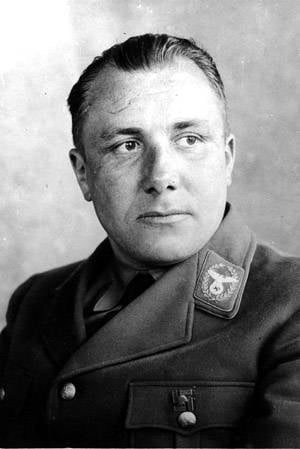 Hitler appointed Grand Admiral Dönitz Reich President of Germany, Minister of War and Commander-in-Chief of the Navy. The Reich Chancellor of Germany was appointed Y. Goebbels, and the Minister for Communications with the Party - M. Borman. The commander-in-chief of the land forces was the commander of the Army Group Center, Field Marshal Schörner. Hitler demanded "all Germans, all National Socialists, men and women, and all soldiers of the armed forces, so that they would remain true to duty and submit themselves to the new government and its president until death."
Hitler appointed Grand Admiral Dönitz Reich President of Germany, Minister of War and Commander-in-Chief of the Navy. The Reich Chancellor of Germany was appointed Y. Goebbels, and the Minister for Communications with the Party - M. Borman. The commander-in-chief of the land forces was the commander of the Army Group Center, Field Marshal Schörner. Hitler demanded "all Germans, all National Socialists, men and women, and all soldiers of the armed forces, so that they would remain true to duty and submit themselves to the new government and its president until death."He also announced that "Goering, Himmler and their secret negotiations with the enemy, conducted without my knowledge and against my will, as well as their criminal attempt to seize state power, in addition to disloyalty to me personally, caused incalculable harm to the country and all the people". He excluded from the party Hermann Goering and Heinrich Himmler, removed them from all government posts. In one place of the testament Hitler, without naming Goering and Himmler by last name, mentioned "despicable beasts"who have undermined the "resistance" to the enemy.
Hitler’s “political testament” was certified by four witnesses: Joseph Goebbels, Martin Bormann, General Wilhelm Burgdorf, and General Hans Krebs. Three copies of this testament were sent to 29 on April Dönitz and Schörner with three couriers who were to overcome the positions of the Soviet troops.
On April 30, the troops of the 14.25 Shock Army of the 3 Belorussian Front took the main part of the Reichstag building in 1. In 14.30, Hitler gave Weidling free rein and allowed him to attempt a breakthrough from Berlin. An hour later, Zhukov was informed that the sergeants M. A. Egorov and the sergeant M. V. Kantaria had hoisted the Red flag over the Reichstag. Twenty minutes after this event, Hitler shot himself.
And yet, as Konev wrote, "The Germans, already clearly doomed to be defeated these days, continued ... to persevere, using our every mistake. In general, by the end of 30 on April, the position of the Berlin enemy grouping had become hopeless. It turned out to be actually dismembered into several isolated groups. The imperial office, from which the defense of Berlin was managed, after losing the communications center of the main command stationed at the Benderstrasse shelter, she lost her telegraph and telephone communication and was left with a poor radio link. ".
War correspondent P. Troyanovsky wrote how at night on May 1 "a German car with a large white flag on the radiator suddenly appeared on the site of a part of Colonel Smolin. Our soldiers stopped firing. A German officer left the car and said one word: "Surrender..." He was understood, accepted and escorted to headquarters. The officer said that the newly appointed chief of general staff, General Krebs, was ready to go to the Soviet command in order to agree on the surrender of the Berlin garrison. The Soviet command agreed to take Krebs ... "
Two military attaches.
Obviously, even before his suicide, Hitler no longer counted on military success, but hoped to survive through diplomatic maneuvers. Perhaps this explained the resignation of the prominent military leader, practitioner and theorist from the post of chief of staff of the German ground forces tank Heinz Guderian Wars. On March 28, the infantry general Hans Krebs was appointed instead. Although Goebbels did not say anything about Krebs' military talents, he was satisfied with this choice, calling him "superb man"Which "was our military attache in Moscow".
Krebs spoke Russian brilliantly and was personally acquainted with Soviet military leaders during his work as an assistant military attaché in Moscow until June 1941. In Berlin, they knew well about a remarkable episode from the activities of G. Krebs. Acting as military attache, G. Krebs was present on the wires of the Japanese Foreign Minister Matsuoka after the signing of the Soviet-Japanese treaty on neutrality. In an effort to emphasize the loyalty of the USSR to the obligations assumed under this treaty, JV Stalin and V. M. Molotov personally arrived at the station and warmly welcomed Matsuoka. At the same time, Soviet leaders tried to demonstrate their readiness to comply with the 1939 treaties signed between the USSR and Germany.
In a government telegram to Berlin, the German ambassador Schulenburg wrote to 13 on April 1941 that during the farewell ceremony, JV Stalin loudly asked about me and, finding me, approached, hugged me by the shoulders and said: "We must remain friends , and now you have to do everything for this! "Then Stalin turned to the acting military attache, Colonel Krebs, and after making sure that he was German, told him:" We will remain friends with you anyway. "Commenting on these words of Stalin, Schullenburg wrote: "Stalin is undoubtedly welcome shaft Colonel Krebs and me so deliberately and thus consciously attracted worldwide attention of a large audience, was present at the same time. "
It is possible that it was not Krebs' service in the various headquarters of armies and army groups from 1941 to 1945, but his experience as a military diplomat in the USSR was primarily sought after by the leadership of the third Reich in the spring of 1945.
At the same time, Goebbels began to study the biographies of those who commanded the Red Army, had already entered the land of Germany. 16 March 1945 Mr. Goebbels wrote: "The General Staff presents me a book with biographical data and portraits of Soviet generals and marshals. From this book it is easy to get various information about the mistakes we made in the past years. These marshals and generals are on average exceptionally young, almost none of them are older than 50 years They have a wealth of experience in revolutionary political activities, are staunch Bolsheviks, extremely energetic people, and you can read on their faces that they have good folk leaven. Most of them are children of workers, boots Ikov, small farmers, etc. In short, I am forced to make unpleasant conclusion that the military leaders of the Soviet Union come from the better strata of the people than our own ".
It is possible that Goebbels’s interest in the Soviet marshals and generals was caused not only by the desire to disgrace his own commanders. Judging by the content of his diary, Goebbels at this time was interested primarily in matters that had practical significance for Germany. It is possible that he wanted to know better about those with whom he wanted to enter into negotiations.
The biography of Vasily Ivanovich Chuikov fully corresponded to the general ideas about the Soviet military leaders that Goebbels had learned from his biographies. Born into a peasant family in the village of Serebryanie Prudy, Venevsky District, Tula Province (now Moscow Region), the future Marshal of the Soviet Union began his working life as a mechanic in Petrograd.
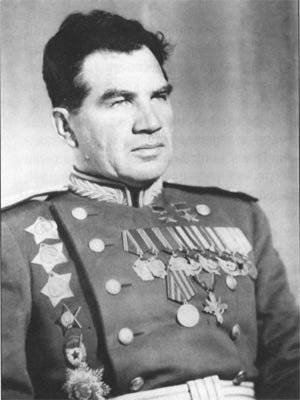 Starting military service in December 1917 in the mine training building in Kronstadt, V. I. Chuikov then joined the ranks of the Red Army. He ended the Civil War with four wounds and as commander of a rifle regiment. Since May 1942, V.I. Chuikov - an active participant in the Great Patriotic War. Under his command, the famous 62-I (then 8-I Guards) army fought in Stalingrad. Then the troops of the "Chuikov" army liberated the Right-Bank Ukraine, Belarus, and participated in the brilliant Vislo-Oder operation.
Starting military service in December 1917 in the mine training building in Kronstadt, V. I. Chuikov then joined the ranks of the Red Army. He ended the Civil War with four wounds and as commander of a rifle regiment. Since May 1942, V.I. Chuikov - an active participant in the Great Patriotic War. Under his command, the famous 62-I (then 8-I Guards) army fought in Stalingrad. Then the troops of the "Chuikov" army liberated the Right-Bank Ukraine, Belarus, and participated in the brilliant Vislo-Oder operation.It is possible that Goebbels paid attention not only to the combat experience of V. I. Chuikov, but also to his education, which enabled him to work in the diplomatic sphere. After completing his studies at the MV Frunze Military Academy, as well as academic courses of mechanization and motorization at this academy, V. I. Chuikov graduated from the Oriental faculty of the same academy. After participating in the 1939 Liberation Campaign and the Soviet-Finnish War, V. I. Chuikov became military attache in China in 1940 and remained there until the beginning of 1942, that is, during our active assistance to this country in its struggle against Japanese aggression. So Chuikov gained diplomatic experience in the complex and subtle affairs of the Far East.
Probably directing General Hans Krebs, the former military attache in Moscow, to the command post to Chuikov, Goebbels knew that the Soviet colonel general had good preparation for conducting international negotiations.
1 May 1945 at the command post of V.I. Chuikov
Learning from V.I. Chuikov about the arrival of H. Krebs, G. K. Zhukov ordered the army general V. D. Sokolovsky to arrive "at the V. I. Chuikov command post for talks with the German general". Simultaneously, Zhukov contacted by telephone with Stalin. In response to the message of Hitler's suicide, Stalin said: "Finished playing, scoundrel. It is a pity that we could not take him alive." At the same time, Stalin ordered: “Tell Sokolovsky. No negotiations, except unconditional surrender, will be held with Krebs or other Nazis. If nothing is extraordinary, don’t call until morning, I want to have some rest. Today is May Day parade.”
Zhukov further wrote about Sokolovsky's call "around 5 in the morning." According to the army general, Krebs cited his lack of authority to negotiate surrender. He also reported: "Krebs is seeking an armistice, allegedly to gather the Dönitz government in Berlin. I think we should send them to the damn grandmother if they do not immediately agree to unconditional surrender."
According to Zhukov, he supported Sokolovsky, adding: “Tell me that if Goebbels and Borman’s consent to unconditional surrender is not given before 10 hours, we will strike a force that will permanently discourage them from resisting.” Further Zhukov wrote: "At the appointed time, there was no response from Goebbels and Bormann. In 10 hours, 40 minutes our troops opened heavy fire on the remnants of a special sector of the defense of the city center". From Zhukov’s memoirs one can come to the conclusion that the visit of Krebs was brief, and Stalin forbade any negotiations at all.
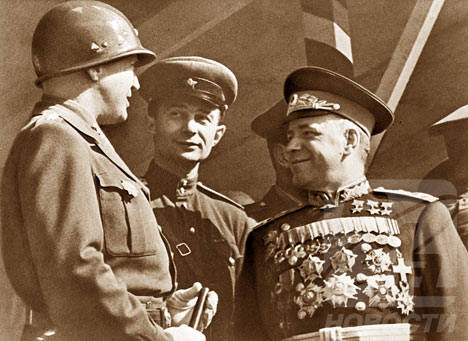
Meanwhile, the most complete description of negotiations with Krebs is available on the 30 pages of Marshal of the Soviet Union, V.I. Chuikov’s book, The End of the Third Reich. Chuikov noted that the writer Vsevolod Vishnevsky, the poets Konstantin Simonov and Yevgeny Dolmatovsky, the composers Tikhon Khrennikov and Matvey Blanter also witnessed the negotiations. Negotiations were transcribed. On the German side, in addition to Krebs, the colonel of the General Staff, von Dufving, who acted as adjutant to the general, as well as a translator, took part in the negotiations.
From the story of V.I. Chuikov, supported by shorthand records, a somewhat different impression is created about the negotiations at his command post than from the memoirs of G. K. Zhukov. First, Chuikov reported that negotiations were going on almost 10 hours. Secondly, Chuikov spoke about the establishment of a telephone connection between the German Reich Chancellery and the command post of the 8 Guards Army. Thirdly, during negotiations with Krebs, Chuikov and Sokolovsky were repeatedly called by certain superior persons. And they could be G. K. Zhukov or I. V. Stalin. Consequently, Stalin, first declaring, according to Zhukov, the inadmissibility of any negotiations, then allowed them to continue and actually participated in them.
The stumbling block in the negotiations was the reluctance of the new leaders of the Reich to surrender without the consent of Dönitz. There were known grounds for this. The roles in the tri-die world formed by Hitler were not clearly defined. The appeal to Stalin was written by Reich Chancellor Goebbels, but he indicated that he was acting on Bormann's instructions. The powers of Krebs were also signed by Bormann. Dönitz was appointed Reich President, that is, the post that was abolished after the death of the last President of the Weimar Republic, Paul von Hindenburg, 2 August 1934. Commenting on Hitler’s last appointments, the former German weapons minister Albert Speer called them "the most absurd in his career statesman ... He could not clearly define how it happened in the last years of his life, who has the highest authority: the chancellor or his office, or the president. According to the letter of the will, Dönitz could dislodge the Chancellor or any of the ministers even if it turned out that they are not suitable for work. So the most important part of the powers of any president was taken from him from the very beginning. "
In addition, the grand admiral who was in Ploine received scant information about what was happening in the bunker of the Reich Chancellery in recent days. Only three hours after the suicide of Adolf Hitler and his wife 30 on April on 18.35, Borman sent Dönitz's radiogram: "Instead of the former Reichsmarshal Goering, the Führer appointed you as his successor. Written instructions were sent to you. Take immediate steps necessary in this situation."
The grand admiral did not receive any messages about Hitler’s departure from life and believed that the highest authority in Germany still belongs to the Führer. For this reason, he sent a reply to Berlin, in which he expressed his loyalty to Hitler. Dönitz wrote: "If by the will of Destiny ... I am destined to rule the Reich as your successor, I will do my best to make the outcome of this war worthy of the heroic struggle of the German people".
The concealment of information about the suicide of Hitler was due to the fact that Goebbels and Bormann feared Himmler, who was in Plön, where Dönitz was. Obviously, hiding the death of Hitler, his heirs believed that as long as Himmler considered the Führer alive, the SS chief would not dare to seize power. They were in no hurry to publish Hitler’s “Political Testament,” according to which Himmler was expelled from the party and deprived of any authority. Most likely, they feared that the premature publicity would only accelerate the actions of Himmler. The head of the omnipotent SS organization could announce Hitler’s “Political testament” transmitted by Hitler’s telegram as false traitors, or even Hitler’s murderers. Goebbels and Bormann hardly doubted that Himmler could put Dönitz under his control or even declare himself head of the Third Reich.
The position of Goebbels, Bormann and others was extremely precarious.
The real power of the heirs of Hitler extended only to a few Berlin quarters. Lev Bezymensky gave accurate data on the territory controlled by the Goebbels government: "From north to south, the length of the empire was exactly 1650 meters - from the Weidendammbrucke bridge to the Prince-Albrecht-Straße; from west to east - 1150 meters - from the Brandenburg Gate to the Shlossplatz square". The German government itself, which was headed by Goebbels, was only the appearance of such. Of the 17 government members appointed by Hitler, there were only three in Berlin: Goebbels, Bormann, and the new propaganda minister Werner Naumann. This explained the insistence of Hitler’s heirs to gather Dönitz and all members of the government in Berlin, which Krebs constantly spoke of. This also explained their fears that Himmler could intercept the initiative in the leadership of Germany.
To substantiate the legality of their position, Goebbels and Bormann had only Hitler’s “Political testament”. Referring to him, Goebbels, Bormann and their supporters stressed that only they are entitled to negotiate surrender. Therefore, the first who outside the bunker found out the content of Hitler’s political testament were Soviet commanders and Stalin. The statements that Goebbels and Bormann preferred to negotiate with the USSR were simply explained: those surrounded by Soviet troops had no choice but to capitulate to them. Paradoxically, Goebbels, Borman and Krebs tried to take advantage of the general capitulation in order to demonstrate their right to speak on behalf of the whole of Germany, that is, to confirm the legitimacy of their government by capitulation.
Krebs told Chuikov and Sokolovsky: "Full and effective capitulation can be resolved by a legal government. If Goebbels does not have an agreement with you, what will happen? You must have a legitimate government prefer to the government of the traitor Himmler. The question of war is already predetermined. The result should be decided with the government indicated by the Fuhrer. "According to Chuikov, Krebs," worrying, almost shouts in Russian: "The traitor and traitor Himmler can destroy the members of the new government! ... Himmler thinks that German troops can still be against the East. He reported this to your allies. It is clear to us, absolutely clear! "
Krebs, Goebbels and others not without reason believed that the Soviet government was ready to accept the surrender of the government, which was trapped in Berlin, and thus end the war in a matter of hours. Otherwise, hostilities could be delayed. At the same time, Soviet military leaders invariably emphasized that all negotiations on general capitulation should take place with the participation of all allies.
At the same time, the seizure of power by Himmler, who had already entered into secret separate negotiations with agents of the Western powers, was unprofitable for the Soviet Union. Therefore, arriving at the command post of V. D. Sokolovsky, referring to G. K. Zhukov, suggested that G. Krebs publicly "declare G. Himmler a traitor, in order to prevent his plans." Visibly animated, Krebs answered: "Very clever advice. This can be done now. Of course, with the permission of Dr. Goebbels". Krebs asked for permission to send Colonel von Dufving to Goebbels.
Chuikov called the chief of staff and ordered the transfer of the colonel and at the same time link our battalion in the front line with the German battalion to establish a telephone connection to Goebbels with the Soviet army command center.
When crossing the line of fire, the group in which von Dufving, the German translator and the Soviet signalmen were in, was subjected to fire from the German side, although the colonel was holding a white flag. Despite the fact that the commander of the Soviet company of telecom operators was mortally wounded, the connection with the Reich Chancellery was established. True, on the German side, communication did not work for a long time. Still, after returning von Dufving, Krebs was able to talk with Goebbels on the phone.
After long negotiations, Krebs read Goebbels by telephone the Soviet terms of surrender:
"1. The surrender of Berlin.
2. All surrenders surrender weapons.
3. Officers and soldiers, on a general basis, saved a life.
4. Help is provided to the wounded.
5. The opportunity to negotiate with the allies on the radio ".
Goebbels demanded the return of Krebs to discuss all these conditions with him.
In farewell to Krebs it was said: "Your government will be given the opportunity to report that Hitler has died, that Himmler is a traitor and to declare to the three governments - the USSR, the USA and England - of complete surrender. Thus, we will partially satisfy your request. Will we help you in creating a government? Not. But we give you the right to inform the list of persons who you do not want to see as prisoners of war. We give you the right after the capitulation to make a statement to the Allied Nations. The fate of your government depends on them ". Krebs was also told that after the capitulation of Berlin, the Soviet troops would give the Germans a plane or a car, as well as radio communication to establish contact with Dönitz.
Krebs: "The list of people in Berlin that we give will not be considered a list of prisoners of war?"
Answer: "This is provided. The officers will retain their titles, orders, edged weapons. We give the right to submit a list of government members, the right to communicate with Dönitz. But all this after surrender.".
Krebs: "So, after the surrender, the Soviet radio will give a message about the death of Hitler, about the new government and about the betrayal of Himmler?" Having received another confirmation of this, Krebs, according to Chuikov, "assured that he would try to quickly agree on everything. 13 hours 08 minutes. Krebs left".
According to Chuikov, after the farewell, Krebs returned twice "already from the ladder: first he forgot the gloves that he had put on the window sill along with his cap; however, he put on his cap, but he did not take the gloves. The second time Krebs returned under the pretext that he had forgotten his field bag, which he did not have He assured that he brought documents from Goebbels and Bormann, although - I remember that well - I took out the papers from the side pocket ".
Chuikov explained Krebs' behavior this way: "By the eyes and behavior was visible - the general hesitated: to go back to hell or to be the first to surrender to the victor’s mercy. Perhaps he expected us to declare him a prisoner, with which he would probably willingly agree".
In the second half of May 1 in the Reich Chancellery bunker: existing versions.
After Krebs crossed the line of fire, Soviet commanders waited for a response from the Reich Chancellery. However, the Germans were silent. Their silence was overwhelming.
G. K. Zhukov recalled: "In the 18 hours V.D. Sokolovsky reported that the German leadership had sent an envoy. He said that Goebbels and Bormann had rejected the demand for unconditional surrender. In response to this, the last assault on the central part of the city began in 18 hours, where the Imperial chancellery was located and the remnants of the Nazis settled down ".
However, there is no documentary evidence that the leaders of the new government actually rejected the Soviet terms of surrender. The envoy did not produce any documents indicating that he was acting on instructions from Goebbels or Bormann. No documents were left about the Goebbels government meeting at which it was decided to reject the Soviet conditions.
In the evening of May 1 a significant part of the inhabitants of the bunker attempted a breakthrough from the Soviet environment. According to William Shearer, from 500 to 600 bunker dwellers, many of whom were SS men, eventually managed to break through. They then found themselves in the Allied occupation zones. Some of them later claimed that Generals Krebs and Burgdorf, as well as the Goebbels couple, did not join the breakthrough group, but committed suicide. It was reported that before the suicide, Magda Goebbels, with the help of a doctor, killed her children. Borman, according to the former bunker obitetley. joined the breakthrough participants, but died on the way.
However, no one could provide convincing evidence of how Krebs and Burgdorf committed suicide. Their bodies were not found.
Contradictory evidence about the death of Bormann on the way out of the bunker. As Lev Bezymensky convincingly proved in his book “Following the Footsteps of Martin Bormann,” statements by Hitler’s personal chauffeur Erich Kempky in his book “I Burned Hitler” disproved his testimony at the Nuremberg trial about the death of Bormann by a Soviet bombardment of a tank. The leader of the "Hitler Youth", Artur Aksmann, who was referenced by W. Shearer, insisted that Borman took poison during the escape. However, his body was never discovered. Martin Borman, whose searches were engaged in a significant part of the twentieth century, disappeared without a trace.
It was a lot of talk about the suicide of Goebbels, his wife, as well as the murder of their children, the bodies of which were found. In his book, H. R. Trevor-Roper, cited the testimony of Adjutant Goebbels Haupssturmführer SS Gunter Schwagerman. He claimed that in the evening of May 1 Goebbels called him and said: "Shvagerman! The greatest betrayal happened. The generals betrayed the Fuhrer. Everything is lost. I will die with my wife and my family ... you will burn our bodies. Can you do this?"
According to Trevor-Roper, Schwagerman promised to do it. After that, the adjutant sent a driver Goebbels and an SS man for gasoline. "Soon (it was half past eight in the evening) Goebbels and his wife passed through the bunker. At the beginning of the stairs they passed Schwagerman and the driver Raha, who stood with gasoline. They walked past without a word, and climbed the stairs to the garden. Almost immediately two shots were fired. When Rach and Schwagerman went out into the garden, they found two bodies on the ground. The SS order officer, who shot them, stood nearby. They obediently poured four gasoline canisters onto the corpses, lit them and left. ".
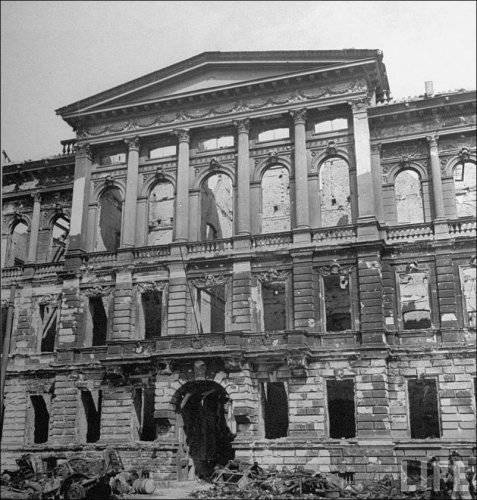
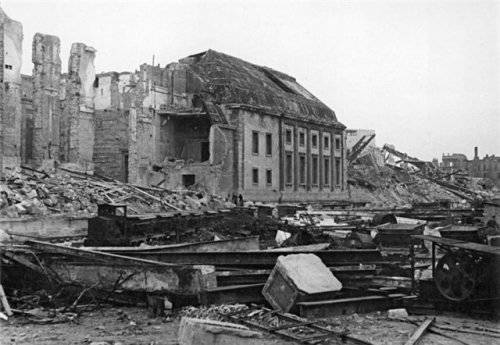
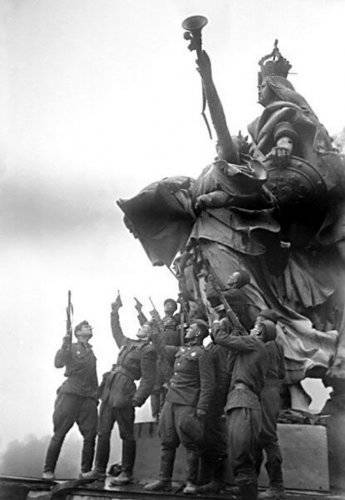
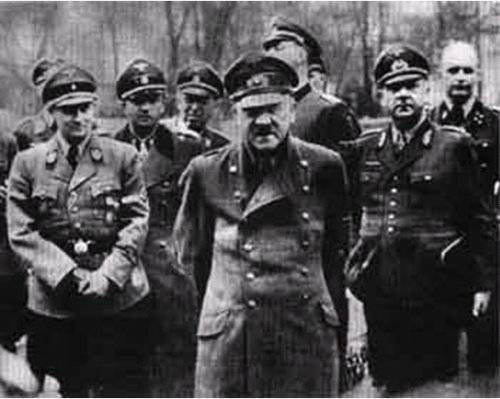
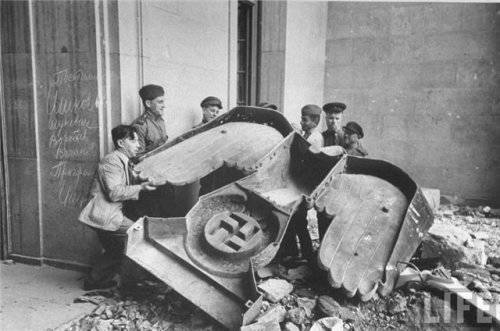
Information